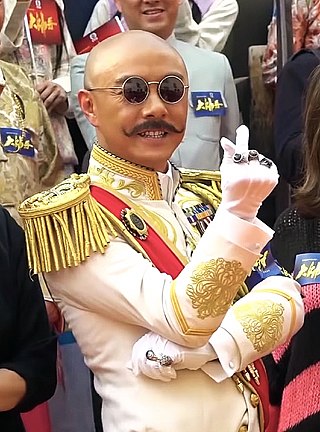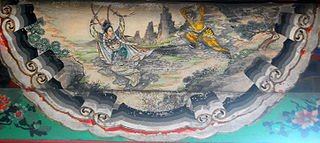
Sun Wukong, also known as the Monkey King, is a literary and religious figure best known as one of the main characters in the 16th-century Chinese novel Journey to the West. In the novel, Sun Wukong is a monkey born from a stone who acquires supernatural powers through Taoist practices. After rebelling against heaven, he is imprisoned under a mountain by the Buddha. Five hundred years later, he accompanies the monk Tang Sanzang riding on the White Dragon Horse and two other disciples, Zhu Bajie and Sha Wujing, on a journey to obtain Buddhist sutras, known as the West or Western Paradise, where Buddha and his followers dwell.

Journey to the West is a Chinese novel published in the 16th century during the Ming dynasty and attributed to Wu Cheng'en. It is regarded as one of the great Chinese novels, and has been described as arguably the most popular literary work in East Asia. It is widely known in English-speaking countries through Arthur Waley's 1942 abridged translation, Monkey.

Ruyi Jingu Bang (Chinese: 如意金箍棒; pinyin: Rúyì Jīngū Bàng; Wade–Giles: Ju2-yi4 Chin1-ku1-pang4), or simply Ruyi Bang or Jingu Bang, is the poetic name of a magical staff wielded by the immortal monkey Sun Wukong in the 16th-century classic Chinese novel Journey to the West.
Wukong is Sun Wukong, the Monkey King in Chinese mythology.
A monkey is a tailed simian.

Monkey: A Folk-Tale of China, more often known as simply Monkey, is an abridged translation published in 1942 by Arthur Waley of the sixteenth-century Chinese novel Journey to the West conventionally attributed to Wu Cheng'en of the Ming dynasty. Waley's remains one of the most-read English-language versions of the novel. The British poet Edith Sitwell characterized Monkey as "a masterpiece of right sound", one that was "absence of shadow, like the clearance and directness of Monkey's mind." The translation won the James Tait Black Memorial Prize in 1942.

Zhang Jinlai, better known by his stage name Liu Xiao Ling Tong, is a Chinese actor, best known for his role as the Monkey King in the 1986 television series Journey to the West adapted from the classic Chinese novel of the same name. Zhang adopted his father Zhang Zongyi's stage name, Liu Ling Tong, and amended it to Liu Xiao Ling Tong.

Monkey Magic is an animated television series produced by B-Factory and animated by Group TAC. The story is an adaptation of the 16th-century novel Journey to the West. To avoid religious implications, the Buddha was named "The Guardian". The series was distributed in the United States by Sachs Family Entertainment and aired there in syndication from September 19 to December 12, 1998, with reruns lasting until September 26, 1999. Bandai Entertainment released Monkey Magic on VHS and DVD in the United States in mid-1999. Additionally, the series aired in Japan on TV Tokyo from December 31, 1999 to March 25, 2000. Sunsoft produced a PlayStation video game based on the series.

Dicky Cheung Wai-kin is a Hong Kong actor and singer.

Princess Iron Fan is a character from the 16th century Chinese novel Journey to the West. She is one of the most popular Journey to the West villains, alongside her husband the Bull Demon King, her son the Red Boy, and Baigujing.

Baigujing is a demon from the 16th century novel Journey to the West. The name is translated into English as White Bone Spirit in the William John Francis Jenner translation. Baigujing is a shapeshifting demoness, and in her true form she is depicted as a skeleton.

Havoc in Heaven, also translated as Uproar in Heaven, is a 1961 Chinese donghua feature film directed by Wan Laiming and produced by all four of the Wan brothers. The film was created at the height of the Chinese animation industry in the 1960s, and received numerous awards, earning the brothers domestic and international recognition. The story is an adaptation of the earlier episodes of the 16th-century Chinese novel Journey to the West.

Monkey King vs. Er Lang Shen is a Puppet/CG Chinese animated film produced by Yuan Cheng. The story is based on an episode of the 16th-century novel Journey to the West.
Son Goku or Son-Goku may refer to:
Journey to the West is one of the Four Great Classical Novels of Chinese literature attributed to Wu Cheng'en.

Journey to the West: Legends of the Monkey King is a 1998 animated series produced by China Central Television and the CINAR Corporation. It is based on the 16th-century novel Journey to the West. There are 26 episodes in total, with a duration of about 22 minutes each, along with a 75-minute prequel television film. In the Original 1998 Chinese edition of the series, there are instead 52 episodes with each segment being extended to a full half hour episode with added animation and dialogue, and the prequels making up episodes 1-7.

Bull Demon King, also translated as the Ox King, also-known by his self-proclaimed title the Great Sage Who Pacifies Heaven, and as Dàliwáng and as Niú Dàli, is a fictional character from the 16th century novel Journey to the West.

Monkey King: Hero Is Back is a 2015 Chinese computer-animated fantasy adventure film written and directed by Tian Xiaopeng in his directorial debut. The film was released on 10 July 2015, and became the highest-grossing animated film in China until it was surpassed by the 2016 films Zootopia and Kung Fu Panda 3.
This page is based on this
Wikipedia article Text is available under the
CC BY-SA 4.0 license; additional terms may apply.
Images, videos and audio are available under their respective licenses.












